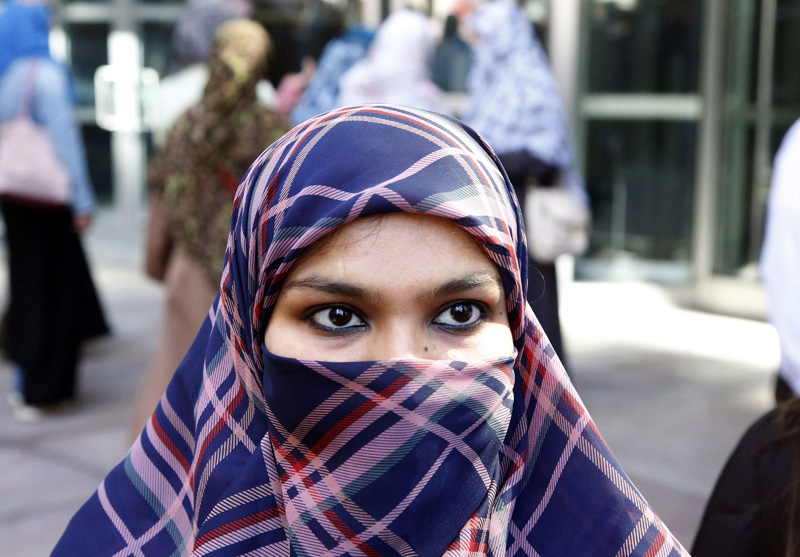
Zunera Ishaq talks to reporters outside the Federal Court of Appeal after her case was heard on whether she can wear a niqab while taking her citizenship oath, in Ottawa on Sept. 15, 2015. Photo courtesy of THE CANADIAN PRESS/ Patrick Doyle
TORONTO (RNS) A Canadian court has cleared the way for a Muslim woman to wear her face veil, or niqab, while taking the oath of citizenship.
The Federal Court of Appeal on Monday (Oct. 5) refused to suspend its ruling from last month that the government may not bar Zunera Ishaq from covering her face during the Canadian citizenship ceremony.
The judge said she found that the government had not demonstrated that refusing the stay “would result in irreparable harm to the public interest.”
The ruling is the third legal defeat for Canada’s Conservative government on the niqab, which has become a hot-button issue in the Oct. 19 federal election.
READ: Another African country bans Islamic veil for women over terror attacks
Ottawa’s policy dates to 2011, when then-immigration minister Jason Kenney announced a ban on face coverings during citizenship ceremonies to ensure that new citizens were reciting the oath and because saying the oath is a “quintessentially public act.”
But documents have shown that Kenney proceeded with the ban despite advice from his own department that religious beliefs should be accommodated in cases where “no security reasons exist.”
Ishaq challenged the policy, and in February the Federal Court ruled that the ban was unlawful because it conflicts with regulations in the Citizenship Act that stress respect for religion.
READ: Quebec bills aim to prevent Islamic ‘radicalization,’ limit face-covering
The court also pointed out that any changes to the oath ceremony must be approved by the Cabinet. Ottawa appealed.
Last month, the appeals court upheld the earlier ruling and issued it hastily, saying it wanted Ishaq to obtain citizenship in time to vote.
The government then appealed to the Supreme Court of Canada and meantime asked for a stay of the ruling, which it has now also lost.
“I am pleased that the courts have reaffirmed my right to citizenship and to vote,” Ishaq said in a statement Monday.
She said the issue “has nothing to do with identity and everything to do with my right — and the right of all Canadians — to think, believe and dress without government interference.”
Ishaq, 29, came to Canada from Pakistan in 2008 and has worn a niqab since she was 15. She refused to take part in a 2011 citizenship ceremony because she would have to show her face.
In his campaign, Prime Minister Stephen Harper has repeatedly supported the niqab ban. The issue has whipped up much pointed debate about identity politics and the targeting of Muslims.
In a statement Monday, the Conservatives said they are determined to press on.
“We have committed to rectifying this matter going forward by introducing legislation that will require one to show their face while swearing the oath of citizenship,” Conservative spokesman Stephen Lecce said.
LM/MG END CSILLAG




